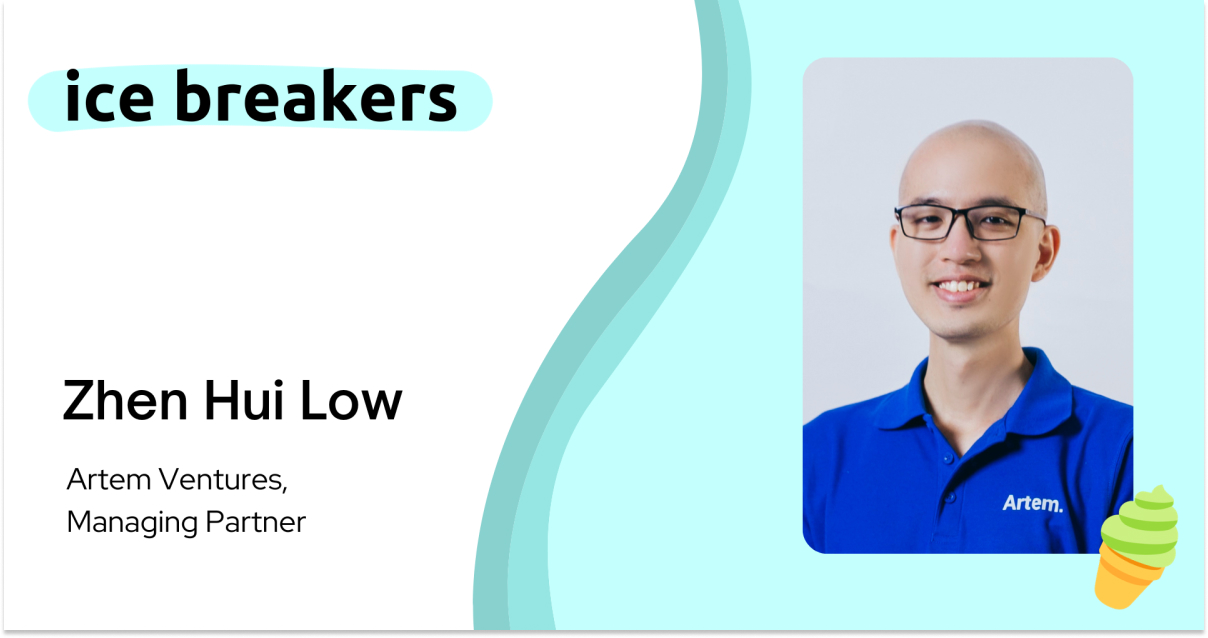
Zhen Hui Low is the Managing Partner of Artem Ventures, a VC firm enabling LPs to achieve their strategic objectives through startup investments.
Artem Ventures backs startups like Qwork, Ejen2u, and MADCash.
👋🏼 How would you explain your job to someone outside tech?
We manage funds that invest in great businesses built by talented and passionate entrepreneurs.
Because building startups is a collaborative effort, we also invest our time, energy, and effort to give our invested businesses their best shot at succeeding.
🧐 What's something about you or your job that would surprise us?
Closing an investment is actually the easiest part of investing, and often the most glamourized one.
Startups celebrate when the money hits their bank, but VCs wait a while longer because we need that exit to happen. This is why we invest with an exit strategy in mind.
By first aligning our startups with this objective, the real (hard) work can begin.
We add value and realize eventual exits by collaborating with our founders on developing the right strategies, giving constructive feedback on their solutions, building up their networks, organizing capacity-building and upskilling workshops for them, and standing with them when things don't work as planned.
🏆 What has been the biggest highlight of your career so far?
Launching Artem Ventures and wrapping up a successful first year with 15 investments has been great, but I found it most rewarding to see our young team grow in skill, experience, and confidence.
At Artem, we strive to offer an environment where everyone can (and should!) speak and expect to be heard, and while there are still some growing pains, I'm glad that we're tackling them as a team.
🔍 What's a startup trend or space you're watching this year?
Fintech is still highly relevant and important to us. The technology is mature and is likely poised, but the problems that fintech was designed to tackle remain prevalent.
Chief among them is financial inclusion, especially in rural communities and those who are part of the informal economy living on uncertain wages.
The unique issues they face require robust data-gathering and analytics for startups to design best-fit solutions, so by extension, we are also keen to see how AI developments can further support startups with their value propositions.
Because insurtech is so closely linked to this space, we are also hoping to see new, data-driven digital insurance products being created for these underserved communities. If you're building such a solution, come talk to us!
Our fund is focused on driving innovation in these areas, including investing in startups with the capability to layer fintech on top of their existing business models.
Beyond fintech, we're also keen on investing in agrifood tech, biotech, climatetech, and deeptech, aimed at addressing problems faced by our agriculture and manufacturing sectors.
💼 What advice would you give someone starting out in your industry?
Be critical and question everything.
Founders are great at what they do because they constantly push beyond their boundaries, and you'd be hard-pressed to keep up with them if you don't hone your critical thinking skills.
But while it's easy to get distracted by big, bright ideas, you must pay close attention to details. It's often a tricky line to walk, but when you're always going over legal documents and dozens of spreadsheets, it's a crucial trait to possess.
🗣 What's one thing you can keep talking about for hours?
I enjoy recounting travel experiences.
🎥 What's your favorite movie/TV show?
Person of Interest. It was a sci-fi show disguised as a crime drama with well-written characters, and I liked how it explored morality and ethics around AI (this was in the early 2010s, mind you), surveillance, technology, and justice.
🍨 What's your go-to ice cream flavor?
Probably a toss-up between cookie & cream and pistachio.
FYI. We've edited this interview for clarity.

The newsletter that keeps you up-to-date on the top stories on tech and business in Southeast Asia. It's fun, quick and free.